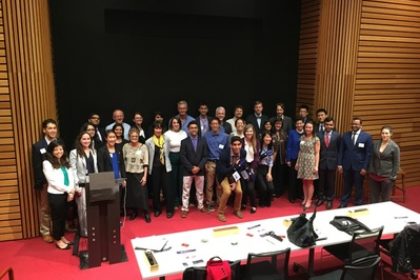
By: Robert E. Snyder, PhD, MPH
Berkeley, CA, Jan 3, 2017
On Friday, January 6, 2017, the second annual Bay Area Global Health Innovation Challenge will open for submissions. The competition seeks to provide translational solutions to critical global health problems around the world, with a focus on low-income and low-resource countries.
Students from any University in the world will be eligible to submit their entries for low-cost, high-impact, and scalable global health innovations. The competition is open to students and trainees in any discipline and at any level of training (undergraduate, graduate, postgraduate). Those with faculty appointments are not be eligible to compete, and all submissions must be student-driven.
The inaugural Bay Area Global Health Innovation Challenge was held last year in San Francisco in conjunction with the 2016 Consortium of Universities for Global Health Conference. It is planned and organized by the HealthRoots Foundation for Global Health, Stanford University (Center for Innovation in Global Health), and the UC Berkeley School of Public Health (Center for Global Public Health). The Challenge’s planning committee is composed of leaders from each of the three organizations, including Professor Stefano Bertozzi, Dean of the UC Berkeley School of Public Health; Dr. Michele Barry, Dean of Global Health at Stanford University; and Dr. Eric Grigsby of HealthRoots.
Last year, more than 85 student teams representing 13 countries participated in the Challenge’s inaugural competition. Ten semifinal teams were invited to the Bay Area to pitch their ideas in front of a high-level panel of judges including the Chief Strategy Officer of PATH, President of the Global Development Program at the Gates Foundation, and venture capitalists such as Tim Koogle, the first CEO and President of Yahoo!, a VC from Kleiner Perkins Caufield Byers, and several successful VC/entrepreneurs. The winning team hailed from the University of Chicago and proposed a novel social enterprise involving the propagation of mealworm farms in impoverished and crowded urban areas. Their innovative use for this income-generating activity involved grinding the cultivated mealworms into a protein-rich flour that could be sold to local bakeries, or as a fertilizer to small-scale farms.
As the Challenge continues to evolve, the organizing committee continues to seek and support projects that have broad, multi-dimensional implications for human health, the environment, and the economy. This year, although all categories will be assessed on an equal playing field, the broad-categories for which the organizers seek student submissions include: medical devices, diagnostics, information and communication technologies (e.g., mHealth apps), wearables/protective gear, and system/service innovations.
“We have a really amazing opportunity through the Challenge to bring together different parts of the global health innovation pipeline – building bridges between private industry, academia, nonprofits, and foundations,” said Dr. Hildy Fong, Executive Director of the UC Berkeley Center for Global Public Health (SPH). “Hosting the Challenge in the Bay Area, and involving judges, mentors, and partners from the Bay Area global health tech ecosystem injects a lot of energy into the event. The most exciting part is seeing these amazing student ideas and prototypes that have a chance to impact population health in a big way—and seeing what happens when we put them in front big-name players from the real world. There is a true potential for a game-changing idea to be funded and scaled through this Challenge.”
The competition will culminate on May 20th and 21st as the top ten teams will be invited to present their innovations in front of a distinguished panel of academics, industry leaders, philanthropists, and angel investors in the San Francisco Bay Area. Teams will also have the opportunity to participate in mentoring workshops and network with their peers from around the globe. These teams will compete for the HealthRoots grand prize of $10,000, and (if they are lucky) additional backing from one of the venture capitalist’s who will be in attendance. The deadline for this year’s submissions is February 28, 2017.
For more information and links to apply, please see: http://www.bayareaglobalhealthchallenge.com/
